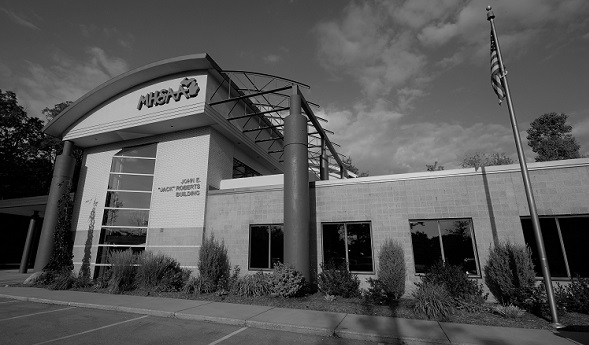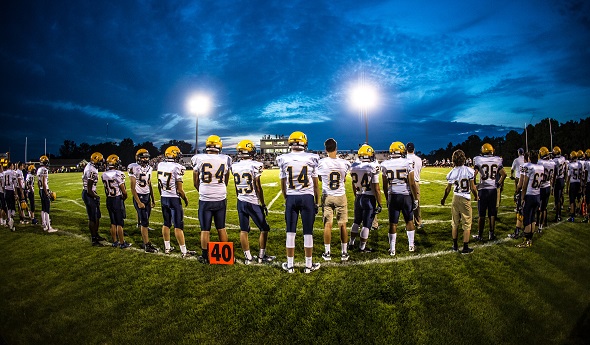
MHSAA Cancels Remainder of 2019-20 Seasons
April 3, 2020
By Geoff Kimmerly
Second Half editor
The Michigan High School Athletic Association has canceled the remainder of the 2019-20 Winter and Spring sports seasons, in compliance with the Thursday “state of disaster” directive by Gov. Gretchen Whitmer closing school buildings and moving education online for the remainder of the school year to help decrease the spread of the COVID-19 coronavirus.
This will be the first school year to not see MHSAA Finals played in multiple sports since 1942-43, when World War II led to the elimination of Finals in most sports.
The MHSAA on March 12 suspended its girls and boys basketball, girls gymnastics, boys ice hockey and boys swimming & diving tournaments amid COVID-19 concerns. All activity in all sports was halted March 13. Spring sports to that point had begun practice, but not competition.
The MHSAA’s Representative Council approved during its Winter Meeting on March 27 a series of concepts for completing the Winter tournaments and an abbreviated Spring season, contingent on the lifting of a statewide quarantine. The closure of school buildings into June made those possibilities void.
The MHSAA’s Executive Committee, comprised of officers of the larger Council, affirmed the decision today to cancel the remainder of this school year’s activities.
“We are heartbroken to not be able to provide these opportunities for Michigan’s student-athletes, and especially seniors. We continue to hear from dozens asking us to hold out hope. But safety always must come first, and Governor Whitmer is making courageous decisions to safeguard the people of our state,” MHSAA Executive Director Mark Uyl said. “We understand as much as anyone how much school sports mean to athletes and their communities. We had ideas and hopes for finishing Winter and Spring and helping bring some sort of normalcy after this long break. But this is the correct decision, and we will play our part in bringing schools and communities together again when the time is right.
“For now, we cannot state strongly enough that all students, staffs and others follow the guidelines established to slow the spread of this virus – we all must do our part.”
Because the five Winter sports were not able to conclude with Finals, no champions will be awarded in those sports for 2019-20. However, championships won at earlier rounds of those tournaments (District or Regional) will continue to stand.
The MHSAA will in coming weeks provide guidelines and other information pertinent to this unusual offseason as attention is turned to preparing for Fall 2020.
The MHSAA is a private, not-for-profit corporation of voluntary membership by more than 1,500 public and private senior high schools and junior high/middle schools which exists to develop common rules for athletic eligibility and competition. No government funds or tax dollars support the MHSAA, which was the first such association nationally to not accept membership dues or tournament entry fees from schools. Member schools which enforce these rules are permitted to participate in MHSAA tournaments, which attract more than 1.4 million spectators each year.

MHSAA Opposes Big Ten Friday Football
November 2, 2016
By Geoff Kimmerly
Second Half editor
The executive director of the Michigan High School Athletic Association said today that he is “disappointed and disheartened” by the Big Ten Conference announcement that it will play and televise football games on Friday nights beginning with the 2017 season.
Friday night football remains one of the strongest and longest-standing traditions in high school athletics, and the MHSAA has fought since the start of this century to keep Friday nights sacred against the overstepping of college football and the damage televised Big Ten games are now expected to cause to attendance and media coverage of the sport at the high school level.
MHSAA Executive Director John E. “Jack” Roberts was contacted by both Big Ten Conference commissioner Jim Delany and Michigan State University athletic director Mark Hollis before the decision was announced. Roberts said he is appreciative of Michigan State and University of Michigan’s low tolerance to be included in this venture – at most, both will host a Thursday or Friday night game during Labor Day weekend and play one Friday night away game during the remainder of a season – but remains frustrated that similar respect for high school football was not shown by the conference as a whole.
Michigan State has played Friday night games during Labor Day weekend the last six seasons, hosting five and playing at Western Michigan University in 2015. However, most Michigan high school games continue to be scheduled and played on the Thursday before Labor Day, relieving holiday travel conflicts in most communities. University of Michigan did play on the Thursday before Labor Day at University of Utah in 2015, but has not played on a Friday night of Labor Day weekend this decade. The Wolverines are one of five Big Ten schools without a Friday night game in 2017.
“We are saddened by this decision. We had hoped that the Big Ten Conference would stay above this. We think this cheapens the Big Ten brand,” Roberts said. “Fans won’t like this. Recruits won’t like this. And high school football coaches won’t like this.
“We are grateful that Michigan State University and the University of Michigan are trying to minimize the effects of this decision by the Big Ten. But overall, this is just the latest step by major college athletics in the pursuit of cash that is just crushing high school sports.”
The MHSAA has shown its opposition to the use of Friday nights for televised collegiate football games for more than 15 years, dating back to 2001 when the NCAA lifted its restrictions on Friday night telecasts, which at first led to the broadcasting of “mid-major conference” games on the same night traditionally reserved for high school athletes.
The MHSAA launched in 2001 its “Save Our Friday Nights” campaign to emphasize the role that Friday night high school athletic events play in communities and to rally MHSAA member schools to contact NCAA member school football coaches, athletic directors and conference commissioners to voice their concerns.
In addition to causing lower attendance at events going up against Big Ten football games, Roberts anticipates that Friday night college games also will leave high school football as a secondary priority in many media markets. More than 80 radio stations statewide cover high school games regularly, but many also carry Michigan State or University of Michigan football. High school football could lose significant time on local TV highlights shows and in print and online coverage as well, as resources are diverted to cover a college game – potentially quieting significantly the positive buzz that comes from the typical high school football Friday night.
“Everyone knows that football is struggling right now,” Roberts said. “It’s getting a lot of bad publicity. Participation is declining. And now this; there couldn’t be worse timing.”
PHOTO: Grand Ledge takes on Okemos under the Friday night lights this season. (Click to see more from HighSchoolSportsScene.com.)

